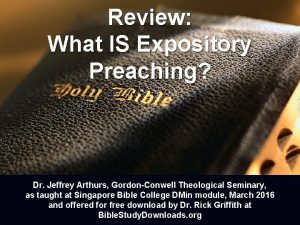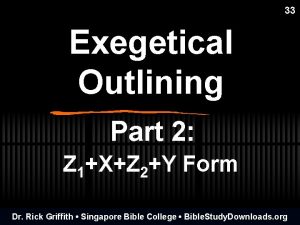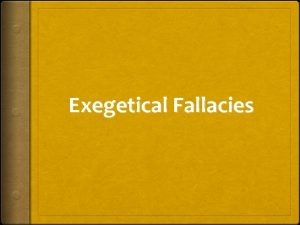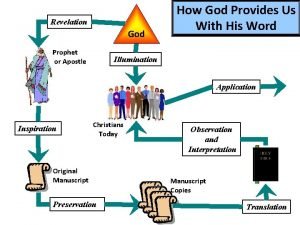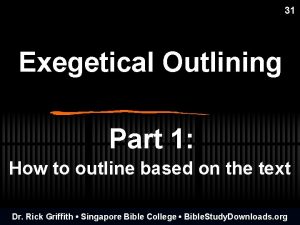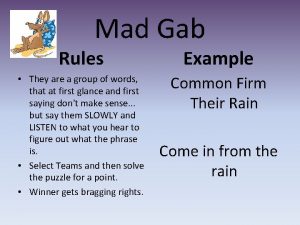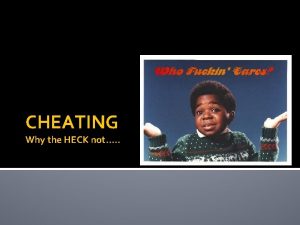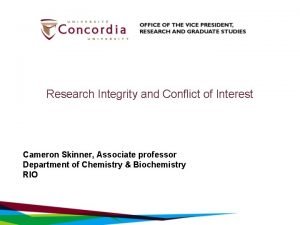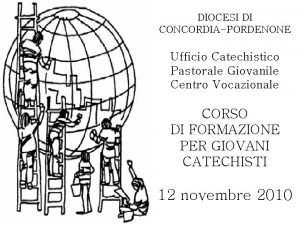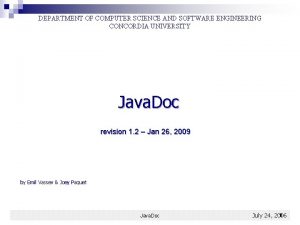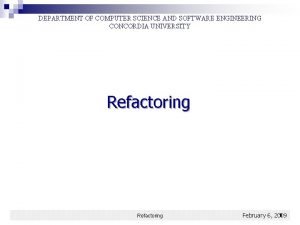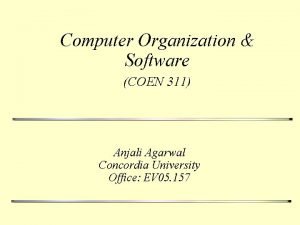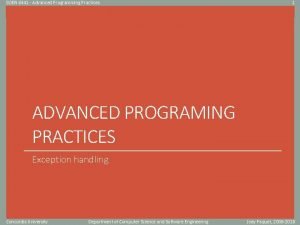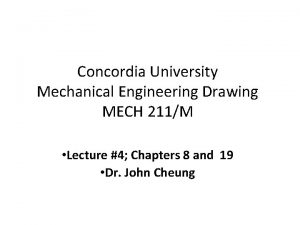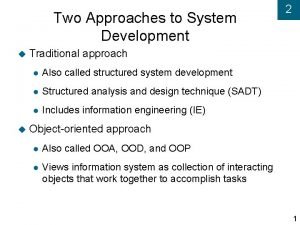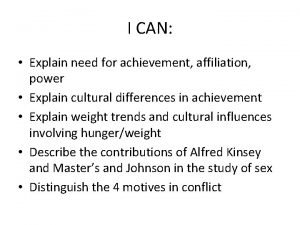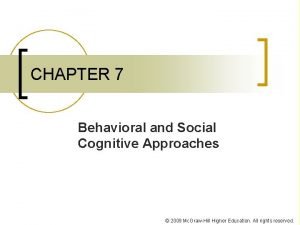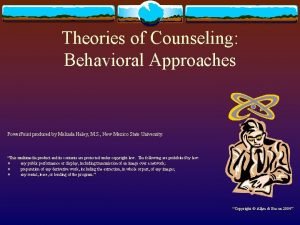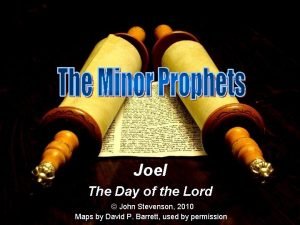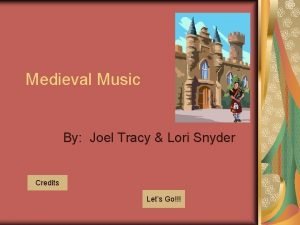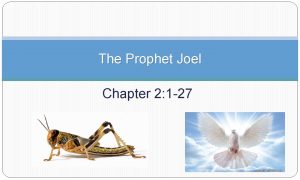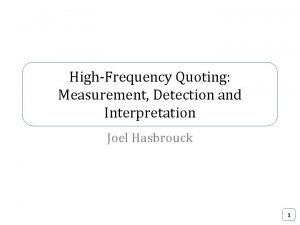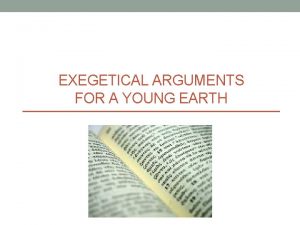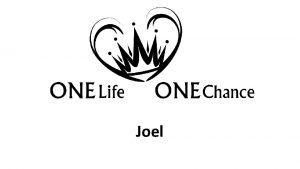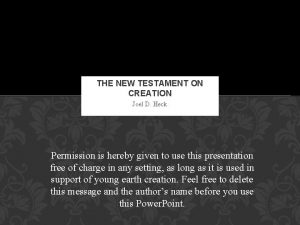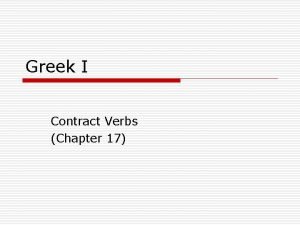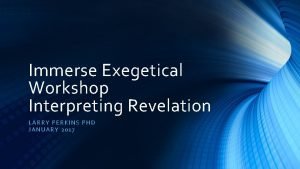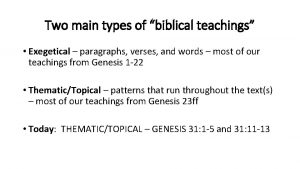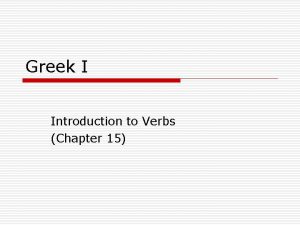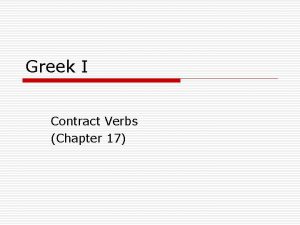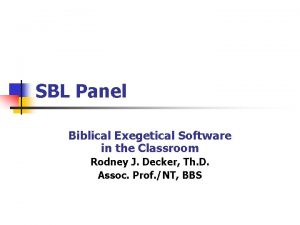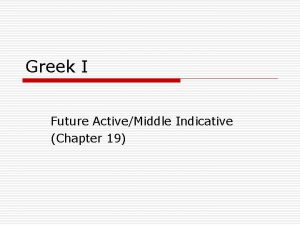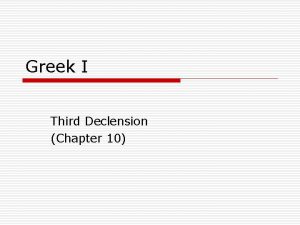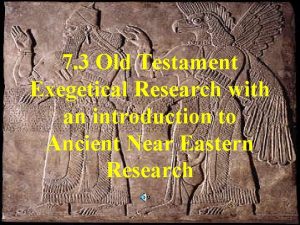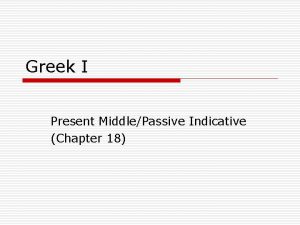AN EXEGETICAL APPROACH TO Joel D Heck Concordia






















































- Slides: 54

AN EXEGETICAL APPROACH TO Joel D. Heck Concordia University Texas

Imagine that you are God, giving an account of the creation of the universe.

If the world truly were billions of years old, and you knew it because you were the Creator and you were tasked with …. ■ … writing an account of a creative era of history spanning billions of years, how would you craft that story? ■ If you were writing fiction, you might wax eloquent about the remarkable accomplishments of that age. But would you confuse people by telling them, ostensibly, that it happened in six days? Would you talk about evening and morning the first day and then repeat that five more times? Would you run the risk of misleading millions of people for thousands of years? I don’t think so.

If the world truly were billions of years old, and you knew it because you were the Creator and you wanted to tell the story … ■ Would you use liturgical language or mythological language? ■ Would you reflect the literature of a people who won’t exist for many centuries yet? Not on your life! ■ Would you use the word “day” in a unique sense that you wouldn’t use anywhere else in your book? ■ I don’t think so.

If the world truly were billions of years old, and you knew it because you were the Creator and you wanted to tell the story … ■ Would you follow that account with more stories that sound both plausible, though amazing, and historical? ■ Would you refer back to that original account in other books, as though it had actually happened as recorded, if it really didn’t happen that way? ■ I don’t think so.

If the world truly were billions of years old, and you knew it because you were the Creator … ■ Would you cede the correct explanation of that written account to those who had become experts, perhaps even Ph. D. s, in the study of that world, or the study of its history, or the study of the development of its language? ■ I don’t think so.

That was a position, assuming God as the author. After all, He really is. ■ But what if you were Moses, or some unnamed Jewish writer of the ninth century B. C. (the Elohist), or someone indebted to the Babylonian Genesis or another mythological account of creation? How would you write about origins? ■ It would depend on your motivation. ■ Were you hoping to correct misconceptions or offer a similar viewpoint or something entirely new for the sake of establishing your reputation or for some other reason? ■ Were you hoping to encourage people to trust God to see you through difficult times?

If you had no idea of the age of the earth, and you wanted to write about origins. ■ Your motivation? If not for correction or building reputation or encouragement during tough times or as a joyful participation in creativity … ■ I suppose, a desire to express my ultimate roots rather than my family roots or my national roots. ■ A perpetual interest in how things work and where they came from.

Then how would you write? ■ Would you give no clues in your writing that this was symbolism or myth or allegory? ■ Would you follow it with stories that appear historical? ■ Would you violate conventional norms of word meanings without letting anyone know? ■ I don’t think so. ■ That said, let’s talk about a fancy word, i. e. , exegesis.

Exegesis ■ Always a strength of the historicalgrammatical approach to Scripture that has long been the practice in the LCMS. ■ What does the text say? ■ Using its words, phrases, grammar, syntax, context, etc. ■ “Keep your finger on the text. ”

Stephen C. Meyer, Signature in the Cell ■ Philip Johnson, University of California, Berkeley, law professor emeritus, Darwin on Trial (1991) ■ Reasoning, or inference, to the best explanation, devoid of presuppositions. ■ Applied to Genesis, we ask, “What is the most likely, most natural, most logical, interpretation of the creation story? ”

The Bible (and Genesis) as History ■ Historical aspects of the stories of Genesis, such as dating formulas, e. g. , Daniel 1: 1, “In the third year of the reign of Jehoiakim king of Judah, Nebuchadnezzar king of Babylon came to Jerusalem and besieged it. ” ■ Geographical place names, most of which (over 90%) are still known today

The Bible (and Genesis) as History ■ Names, ages, known historical events and customs, genealogies, the nature of the reporting of events, authentic cultural details, etc. ■ Egyptian loan words in the Joseph story (Genesis 3750) ■ A literal interpretation is the default interpretation in all biblical exegesis and actually in all communication. That’s what you assume unless the context indicates otherwise. ■ “To take the Bible literally is to take the Bible

The Bible (and Genesis) as History: Genealogies ■ Genesis 5 is the only place in Scripture where the age of the father at the birth of the son is mentioned. ■ 1 Chron. 1: 1 -3 has the same ten people implied by Jude 14 with its reference to Enoch as “the seventh from Adam”

The Bible (and Genesis) as History: Genealogies ■ The historical nature of the Old Testament is powerfully affirmed by these genealogies. ■ In addition, the complete list of genealogies in 1 Chronicles 1 -9 suggests a limited length of time not even approaching tens of thousands of years.

The Bible (and Genesis) as History ■ The colophons of Genesis (P. J. Wiseman, Ancient Records and the Structure of Genesis: A Case for Literary Unity, 1936, 1985) ■ The recurrent “catch-lines” or colophons in Genesis, in this format—“These are the family histories (generations) of. . . , ”—are clues to the literary structure of Genesis and indicative of its origin and transmission, very likely written originally on clay tablets.

The Bible (and Genesis) as History The events recorded in the twelve sections of Genesis contain a person (or persons) who could have written that entire section from personal knowledge or from contemporary information.

The Outline of Genesis ■ Gen. 2: 4, “This is the account of the heavens and the earth. ” ■ Gen. 5: 1, “This is the written account of Adam’s line. ” ■ Gen. 6: 9, 10: 1, 11: 19, 11: 27, 25: 12, 25: 19, 36: 1, 36: 9, 37: 2, “This is the account of Noah …Shem, Ham and Japheth, Noah’s sons … This is the account of Shem … This is the account of Terah … Ishmael … Isaac … (that is, Edom) … Esau the

The Testimony of the New Testament The NT writers base important arguments and illustrations on Genesis, which would be useless and misleading if based upon legend. The testimony of Jesus (and others), such as the sign of Jonah, verifies the historicity of

General Arguments ■ Some distinguish between primeval history (Genesis 1 -11) and patriarchal history (Genesis 12 -50), but this is a difference in time and content rather than literary genre. ■ Large portions of the Old Testament are poetic in nature, but even poetry conveys a great deal of literal truth. ■ Jesus’ comments about Adam and Eve, Cain and Abel, Noah and the Flood, Sodom and Gomorrah, Jonah, etc.


The Historicity of the Flood Account ■ Historical global catastrophe ■ Historical local catastrophe ■ Historical global peaceful flood ■ Myth

The Historicity of the Flood Account ■ It reads like a diary (Gen. 7: 11 -12, 24, Gen. 8: 4, 6, etc. ). ■ Jesus considered the account to be history (Matt. 24: 37 -39): “For as were the days of Noah, so will be the coming of the Son of Man. For as in those days before the flood they were eating and drinking, marrying and giving in marriage, until the day when Noah entered the ark, and they were unaware until the flood came and swept them all away, so will be the coming of the Son of Man. ”

The Historicity of the Flood Account Peter considered the account to be history (1 Peter 3: 20): “…they formerly did not obey, when God's patience waited in the days of Noah, while the ark was being prepared, in which a few, that is, eight persons, were brought safely through water. ”

The Historicity of the Flood Account 2 Peter 2: 5, “… if he did not spare the ancient world, but preserved Noah, a herald of righteousness, with seven others, when he brought a flood upon the world of the ungodly, …”

The Historicity of the Flood Account 2 Peter 3: 3 -7, “scoffers will come in the last days with scoffing, following their own sinful desires. 4 They will say, “Where is the promise of his coming? For ever since the fathers fell asleep, all things are continuing as they were from the beginning of creation. ”

The Historicity of the Flood Account “ 5 For they deliberately overlook this fact, that the heavens existed long ago, and the earth was formed out of water and through water by the word of God, 6 and that by means of these the world that then existed was deluged with water and perished. ”

The Historicity of the Flood Account But by the same word the heavens and earth that now exist are stored up for fire, being kept until the day of judgment and destruction of the ungodly. ” “ 7

The Historicity of the Flood Account: Isaiah 54: 9, “This is like the days of Noah to me: as I swore that the waters of Noah should no more go over the earth, so I have sworn that I will not be angry with you and will not rebuke you. ”

The Historicity of the Flood Account: Ezekiel 14: 14, “even if these three men, Noah, Daniel, and Job, were in it, they would deliver but their own lives by their righteousness, declares the Lord GOD. ”

The Historicity of the Flood Account ■ The genealogy of Jesus (Luke 3: 36): “… the son of Cainan, the son of Arphaxad, the son of Shem, the son of Noah, the son of Lamech, …. ” ■ More than three hundred flood traditions around the world



Extinction of Dinosaurs

Is Genesis One Prose or Poetry? ■ Stephen Boyd studied the verbs that appear in narrative sections and those that appear in poetic sections of the Old Testament. ■ His finding: The likelihood that Genesis One is narrative (i. e. prose) is 99. 99%.

Prose vs. Poetry ■ Boyd selected 97 biblical passages. ■ 48 of them were narrative prose. ■ 49 of them were poetic. ■ Diagram of a logistic regression

522 Texts 295 Narrative 227 Poetry

Narrative Poetry

■ Stephen Boyd: The nature of statistics is that all results are stated in terms of probabilities. So strictly speaking, we can say that with two choices for the genre of Genesis 1: 1 -2: 3 (poetry or narrative), this text is narrative, not poetry, with a very high degree of probability. Or to put the results in scientific terms: the text is a narrative with statistical certainty. In other words, ■ It is statistically indefensible to argue that this text is poetry. ■ And we all know why some argue that way.

The Word “Day” (Yom) ■ “Day” appears 2, 301 times. Why do some only question what “day” means in Genesis 1? ■ “Back in my father’s day it took 3 days to drive across Texas during the day. ” ■ Three different usages. Context determines the meaning. ■ Words can mean different things, but only one meaning makes sense in a certain context. ■ “The student center is giving away guitars. No strings attached. ”

“Day” ■ ■ 410 times with a number. Always translated “day. ” “Evening” or “morning” 23 times, each with day. “Evening and morning” 38 times without “day. ” “Night” with “day” 52 times. Always means 24 hours. ■ All of these appear in Gen. 1: 5. ■ For seventeen reasons why “day” means 24 hours in Genesis 1, see …


www. joelheck. co m

Scripture interpreting Scripture ■ There are no references in the Old Testament to Darwinian evolution or billions or years. ■ There are no references in the New Testament to Darwinian evolution or billions or years.

Mark 10: 6 “But at the beginning of creation God ‘made them male and female. ’” Darwinian Evolution: 14. 6 billion years Old Earth Creationism: 14. 6 billion years Young Earth Creationism: < 10, 000 years

Language in Genesis One ■ A simplicity of style, which suggests a very early date. ■ Verses 6 -7, and 9 -10, “water” and “seas” rather than “river” or “lake” or “sea” ■ Verses 11 -12, “vegetation, ” “plants, ” and “trees, ” not fescue, and sycamore trees

Language in Genesis One ■ Verse 16, “two great lights, ” “the greater light, ” and “the lesser light” rather than “the sun” and “the moon” ■ Verses 24 -25, terms for various types of animals ■ The idea of naming—when do you name things?


“Chances are, if you’re reading this, you don’t believe in the fable of Adam and Eve and the talking snake. You probably think it’s a story, created out of ignorance, to explain the origin of life. You probably don’t believe that Adam literally ate a fruit, resulting in God expelling him and Eve out of the idyllic Garden of Eden. In other words, you know that’s a myth. ■American Atheists Christmas Campaign, https: //atheists. org/atheism/Christmas.

“Right so far? So if Adam and Eve and the Talking Snake are myths, then Original Sin is also a myth, right? Well, think about it. . . Jesus’ major purpose was to save mankind from Original Sin. Without Original Sin, the marketing that all people are sinners and therefore need to accept Jesus falls moot. ■American Atheists Christmas Campaign, https: //atheists. org/atheism/Christmas.

“. . No Adam and Eve means no need for a savior. It also means that the Bible cannot be trusted as a source of unambiguous, literal truth. It is completely unreliable, because it all begins with a myth, and builds on that as a basis. No Fall of Man means no need for atonement and no need for a redeemer. You know it. ” ■American Atheists Christmas Campaign, https: //atheists. org/atheism/Christmas.

Summary ■ Exegesis rather eisegesis ■ The Old Testament is primarily history. ■ Genesis is almost exclusively history.

Summary ■ The New Testament treats both creation and the flood as history. ■ Stephen Boyd: Genesis is prose, not poetry ■ The meaning of the word “day” ■ Jesus was a young earth creationist.

Summary ■ The simplicity of the language of Genesis 1, suggesting it was written very early ■ The connection of the Gospel message itself to the first chapters of Scripture ■ Do we really want to adopt a position that atheists use to support their views? ■ We affirm a straightforward reading of the text of Genesis 1.
 Exegetical method
Exegetical method Exegetical idea vs homiletical idea
Exegetical idea vs homiletical idea Exegetical outline
Exegetical outline Exegetical fallacies
Exegetical fallacies Lexicons
Lexicons Exegetical sermon outlines
Exegetical sermon outlines Ulrich heck
Ulrich heck Heck tate is wise and tolerant
Heck tate is wise and tolerant Had tom ever come inside the ewell’s fence before?
Had tom ever come inside the ewell’s fence before? Ace lip puff that hung
Ace lip puff that hung Mad gab puzzle solver
Mad gab puzzle solver Why the heck not
Why the heck not Ulrich heck
Ulrich heck What the heck bro
What the heck bro Comp 6321
Comp 6321 Cameron skinner concordia
Cameron skinner concordia Banweb concordia
Banweb concordia Gradproskills
Gradproskills Diocesi concordia pordenone ufficio catechistico
Diocesi concordia pordenone ufficio catechistico Mystudentcenter concordia
Mystudentcenter concordia Sofiene tahar
Sofiene tahar Concordia r2
Concordia r2 Concordia international school hk
Concordia international school hk Originality form concordia
Originality form concordia Software engineering concordia
Software engineering concordia Software engineering concordia
Software engineering concordia Graziano diritto canonico
Graziano diritto canonico Software engineering concordia
Software engineering concordia Aiman hanna concordia
Aiman hanna concordia Coen 311
Coen 311 Soen 6441 concordia
Soen 6441 concordia Hay quienes pretenden ser ricos
Hay quienes pretenden ser ricos Concordia university mechanical engineering
Concordia university mechanical engineering Titanic vs costa concordia
Titanic vs costa concordia What is research approach
What is research approach International market selection model
International market selection model Traditional approach to systems implementation
Traditional approach to systems implementation Approach approach conflict
Approach approach conflict Tony wagner's seven survival skills
Tony wagner's seven survival skills Difference between datagram and virtual circuit network
Difference between datagram and virtual circuit network Cognitive approach vs behavioral approach
Cognitive approach vs behavioral approach Theoretical models of counseling
Theoretical models of counseling Joel shaul
Joel shaul Broken vessels joel houston
Broken vessels joel houston Web client
Web client Joel
Joel Billy joel tracy
Billy joel tracy Gkood
Gkood Joel sermon series
Joel sermon series Oldcart pain
Oldcart pain Stephanie nord
Stephanie nord Joel chapter 2
Joel chapter 2 Paul djordjevic
Paul djordjevic Angie varona sexting
Angie varona sexting Joel hasbrouck
Joel hasbrouck

